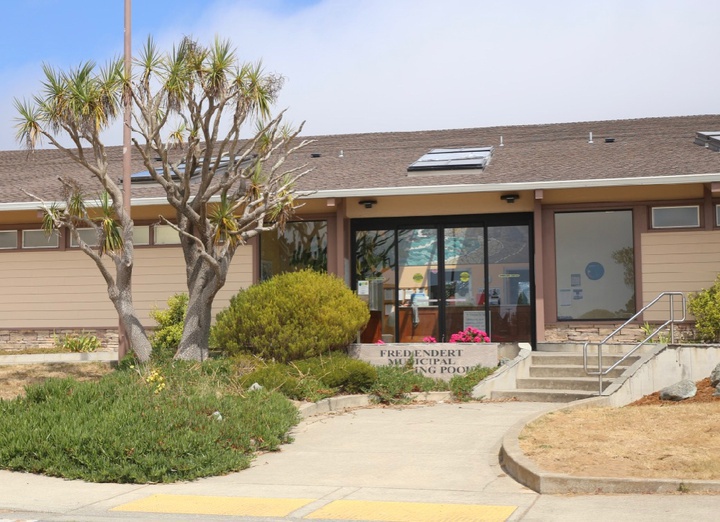Jessica Cejnar Andrews / Thursday, Jan. 18, 2024 @ 1:22 p.m. / Infrastructure, Local Government
Crescent City May Have To Settle For Less Efficient HVAC Upgrades To Pool; Will Move Forward With Flooring Project

Crescent City will move forward with energy efficiency and floor replacement projects at the Fred Endert Municipal Pool. | File photo by Andrew Goff
Crescent City Councilors may have to settle for a less efficient upgrade to the Fred Endert Municipal Pool’s HVAC system if they want to keep the project within budget.
Though they were dismayed at the news, Councilors agreed Tuesday to let staff seek bids so they could get a better idea of what the actual cost estimates would be. City Manager Eric Wier noted the project would still include dehumidification units, which would improve the environment inside the building.
“Even if we deliver a project with the replacement of the existing boilers as they are, that is a significant investment,” Wier said. “The dehumidification piece is a game changer for the pool as far as just that environment side. Then the Council and staff will have to be that much more proactive because we can’t wait another 15 years to replace [the boilers] again.”
Three City Councilors authorized staff to advertise for two separate pool-related projects. The first involves replacing the floor in the locker room and along the deck, which had been chipping.
According to Public Works Director Dave Yeager, the floor replacement costs are estimated to be $320,000.
The second project is an energy efficiency project that includes higher efficiency condensing boilers, a new pool circulation pump, building dehumidifier units, an on/off switch with timer for the spa pump and a more efficient heat exchanger for the spa and showers. The energy efficiency project also includes repairing the building envelope.
AECOM, a multi-national consulting firm that did the project design and engineering, estimated that it would cost between $1.5 million and $2.1 million to do the energy efficiency project, according to Yeager.
However, he said, if the city decided to replace the existing boilers with similar, though newer, boilers, it would save between $300,000 and $500,000 on project costs.
According to Yeager, about $516,233 in Measure S tax measure dollars and $670,158 in American Recovery Act dollars have been set aside for the energy efficiency project.
Measure S dollars are being used for the floor project, according to Yeager.
“We have about $1.05 million available,” he told councilors. “At the low end of the budget, if we remove the boiler system replacement it may get us to that $1 million if we subtract $500,000 from $1.4 million.”
The public works director proposed upgrading the HVAC system and replacing the flooring at the same time to limit pool closures.
Yeager’s update on the pool came about a year after Johnson Controls Inc. withdrew from the energy efficiency project.
Representatives from the firm’s Medford offices had conducted an energy efficiency audit in early 2021.
Johnson Controls recommended upgrading the pool’s HVAC systems and replacing the city’s water meters. However, they only agreed to do the pool project if the water meter replacement project was also included. At more than $5 million, the water meter project exceeded the city’s budget.
According to Wier, Johnson Controls didn’t include plans and specifications for the pool project.
Crescent City Mayor Blake Inscore was amenable to bidding both the energy efficiency and floor projects out to find out what contractors’ bids would be. He noted that Crescent City had an obligation to its residents, particularly those that supported the Measure S sales tax measure in 2020 and 2022.
“Those who supported Measure S in part supported it with the idea that they were told a major investment was going to be made in the pool,” he said. “I think we have a responsibility within reason to try to deliver on that commitment, and that’s a challenge because we made a commitment based on very different circumstances and different numbers.”
Inscore referred to a swimming pool master plan that was completed in 2019. According to that master plan, the pool costs the city more than $700,000 and brings in between $200,000 and $250,000 a year in revenue.
Inscore pointed out that municipal pools never pay for themselves.
“We even did research with things like YMCAs and the difference there they get private funding donations to help supplement costs like that,” he said. “Municipal pools never pay for themselves, so the question then becomes what’s the benefit to young people — obviously swimming lessons, and things like that — but also [for] our not-so-young who use the pool for their mobility. That’s what keeps them moving.”
Yeager said swimming pool staff are also anticipating improvements.
“They shouldn’t have chipped concrete on the pool deck and shouldn’t have the roof raining,” he said.
Councilors Jason Greenough and Isaiah Wright were absent.
CLICK TO MANAGE